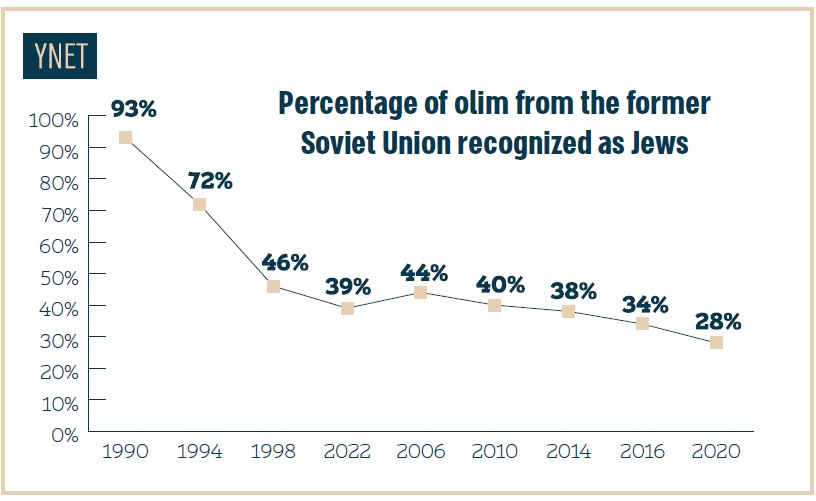Returning to the Law of Return
The Law of Return is one of the most important laws in the State of Israel. This law, which opens with
the solemn words “every Jew has the right to immigrate to Israel”, is intended to grant the right of
return and a bestow an “insurance certificate” of sorts, to every Jew in the world.
However, in recent years, the Law of Return
has functioned counter to its original purpose.
Instead of facilitating the immigration of Jews,
most of the immigrants granted citizenship under
this law are not actually Jewish. As time
goes on, the percentage of the non-Jewish immigration
it facilitates increases, and the percentage
of Jewish immigration it facilitates decreases.

Data recently published in the Israeli media indicates
a drastic decrease in the percentage of
halachic Jews immigrating on the basis of Law
of Return eligibility, in particular amongst immigrants from the countries of the former Soviet Union –
from a proportion of 90% Jews at the beginning of the large-scale immigration years in the nineties,
to less than 30%, today. In other words: today, out of about ten immigrants from
the former Soviet Union, less than three are halachic Jews.
Just in the last year, 2022, over forty thousand non-Jews immigrated to Israel.
That means that more non-Jews joined Israeli society in one year than the total
number of converts from the former Soviet Union who converted to Judaism in
the last twenty years.
It is important to emphasize: this is not a temporary phenomenon. The changing
demographics of the Jewish people, particularly the high rate of mixed marriages,
mean that the number of non-Jews eligible for aliyah increases year by
year. Already today, according to the data of the senior Jewish demographer
Prof. Della Pergola, , there are about ten million non-Jews who are entitled to
immigrate to Israel and their number is only increasing.
The current Law of Return, amended about fifty years ago (1970), allows (at
least) five non-Jews to immigrate following the marriage of a Jew to a non-Jew.
In practice, this number is even higher, due, in part, to minor great-grandchildren
also being allowed to enter Israel together with their parents as part of the
Entry Law, in order not to break up families.
This situation, in which the very act of marrying a Jew, the son or grandson
of a Jew immediately grants citizenship rights, should also trigger a renewed
discussion. It is difficult to understand how it is possible that the mere act of
marriage confers an automatic and immediate right to return to Israel and Israeli
citizenship, whereas, marriage to an Israeli citizen, confers citizenship only
after about five years and after proving settlement in Israel and the sincerity
and continuity of the relationship over time.

In this context, we note another absurdity: a Jew who converted to another religion loses his
right to aliyah, however, the son and grandson of a Jew, who are not themselves Jewish, and
can even be active members of another religion, are granted those rights and are even able to
extend those privileges to all the immediate members of their Christian, Muslim, etc., families.
These factors taken together, have dramatic implications. Today, the population of non-Jews
in Israel who are not Arabs, already numbers over half a million people. Over a relatively short
span of time, about twenty-five years, this population grew from eighty thousand to five hundred
and twenty thousand non-Jewish Israeli citizens. At this rate, , it can be assumed that in
the year of the country’s centenary, in 2048, close to a million and a half (and maybe much
more) non-Jews who are not Arabs will live in Israel.
There is a real fear of changing the face of Israel and the creation of a new Israeli fifth column
that could damage internal-Jewish-Israeli cohesion and accelerate the trends towards Israel
becoming just another cultural melting pot without something making it inherently a “Jewish
State”.

From the religious perspective, there is of course, the fear of mixed marriages-
“Israeli assimilation”. If in the past it was customary to think that the fear of assimilation was the domain of Diaspora Jewry only, now it turns out that even in Israel there is no longer any certainty that our grandchildren will be Jews.
This situation should cause sleepless nights for any Jew who holds the
State of Israel dear to their heart and the for whom the future of the Jewish people is important.
Of course, amending the Law of Return
should be done with great sensitivity. With this in mind, it is important to note that the
proposed amendment’s impact on Americans’ ability to immigrate to Israel is negligible, because
the large majority of American immigrants to Israel are Jews in own their right ?and a
small number of their close non-Jewish family members?.
Therefore, amending the Law of Return restores its ability to facilitate its raison d’etre: to allow
Jews to immigrate Israel, with little or no cost to American Aliyah.
Therefore, it is imperative to find the right balance between maintaining the unity of the Jewish
people, and Israel’s relationship with the Diaspora. At the same time, efforts need to be made
in order to bring the Law of Return back to its’ original goal: the Law enabling the immigration
of Jews to Israel
